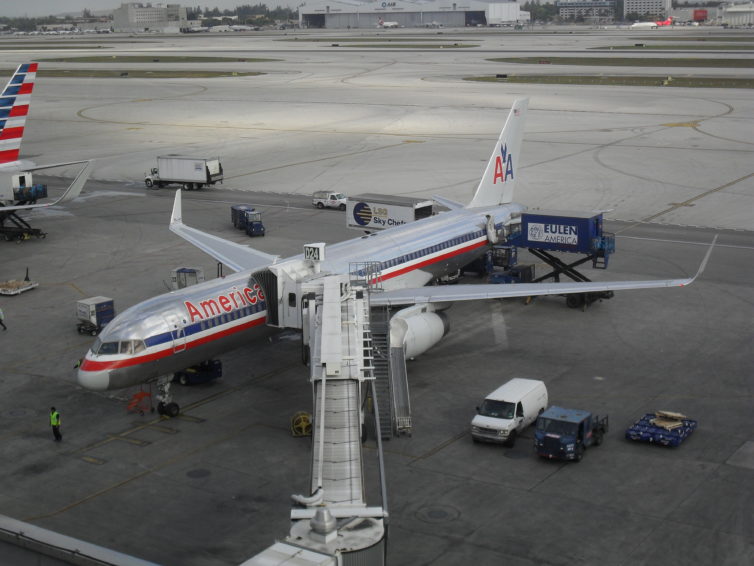
Presumably pre-nine group process, an American Airlines 757-200 boards in Miami – Photo: Jake Grant | AirlineReporter
One of the most viewed stories here at AirlineReporter year in and year out is the primer on how different airlines board their flights. Of course, this is something that every passenger, from the lucky few who board Etihad’s Residence to the basic economy flyers on American, United, and Delta have to do in order to take their flight, so it will forever be a question that travelers are asking. However, even that last sentence belies the reason for this update.
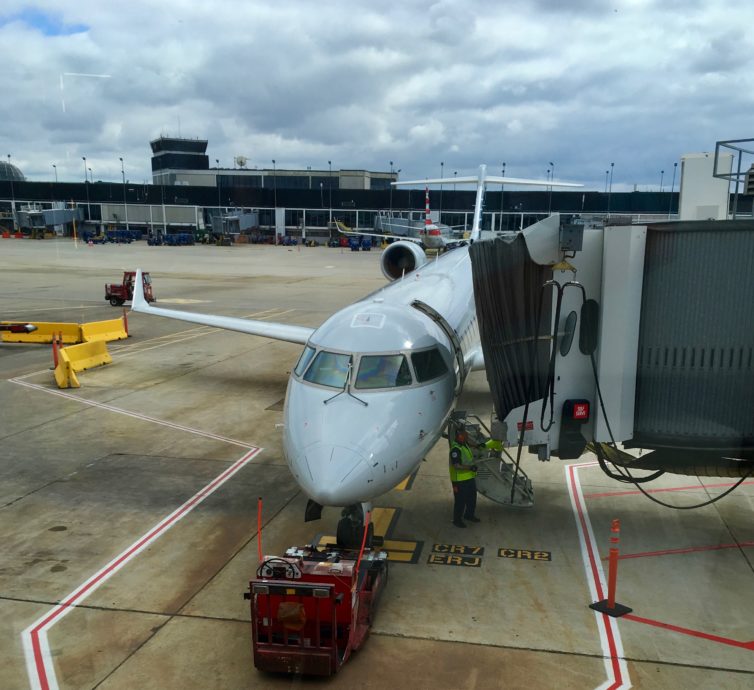
In the midwest, boarding from the ramp is rare, even for smaller regional jets – Photo: Jake Grant | AirlineReporter
The original post was written five years ago, almost an eternity in the aviation business. In fact, neither the aforementioned luxurious Residence nor basic economy at the other end of the spectrum had been implemented yet. Therefore, we felt it was time to dust off an old favorite.
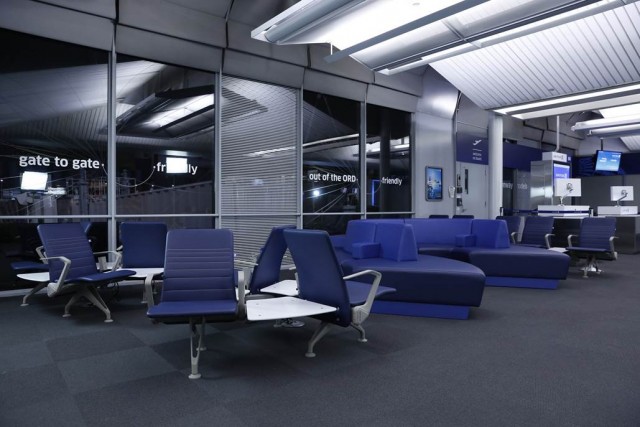
Updating the gate area means seating that can be enjoyed by everyone – Photo: United
On my recent trip to Chicago with United to experience their new United Club cuisine, we were shown something that the airline had been working on. Something that would have been obvious to so many, but that not so much to others. United has been working on many different ways to improve their boarding experience.
We have all had a bad boarding experience. A delayed flight, people massing at the gates (gate lice), no order at all, bad communication, and confusion. Airlines all board aircraft in different fashions, and each airline has someone (or a team) of people, who are consistently re-evaluating how the boarding process can efficient. Some new methods work well, others are silently stopped and never spoken about again.
But what is sometimes forgotten about in the boarding process is what that gate area looks like, how it is handled, and how passengers actually feel about it. United has decided to take a look at all of these factors and decided on trying a new boarding experience — one where even passengers had some role in the decision-making process.
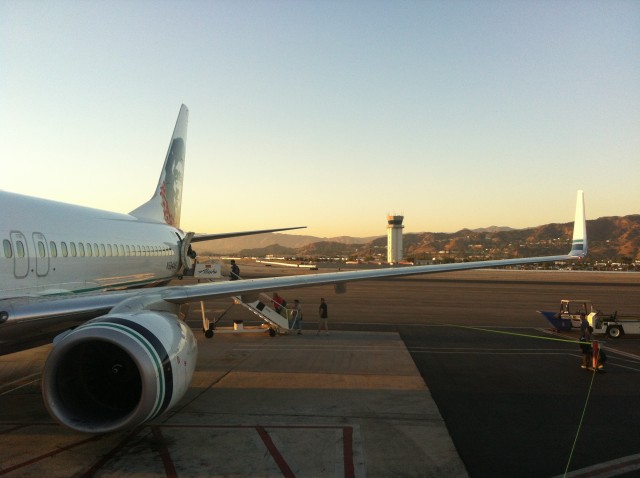
Boarding an Alaska Airlines Boeing 737 at Burbank. Image by Colin Cook.
It used to be that most major airlines shared commonalities in the way they boarded passengers. However it seems that each airline has so their own boarding processes that it’s hard to keep up. Sure, the way an airline boards likely won’t sway a decision on which airline to fly, I wanted to put together a list of how some of the major airlines operate their boarding process.
As one would expect, the majority of airlines give priority boarding to their elite level fliers. Having personally achieved even a low level MVP with Alaska Airlines I can say that I would never want to go back to being just ’œone of the herd.’ While I haven’t gone on a ’œmileage run’, there are many well documented stories of folks taking a quick trip just for the sake of achieving elite-level status.
With precious overhead space and many airlines now charging for checked luggage it’s become a race to get on board as early as possible. While some low cost carriers are now charging for carry-on bags, the major US airlines typically allow one carry-on bag (i.e. a roller bag or other bag for the overhead bin) and one personal item (laptop bag, purse, backpack, etc). Since many travelers are now bringing a large carry-on bag, boarding times have soared. An article in the New York Times suggested that boarding a plane with 140 people in the 1970’s took about 15 minutes which has more than doubled to 30-40 minutes.
Without further adieu, here is how the various airlines handle their boarding procedures (a small note: these are all the boarding requirements as found by AirlineReporter.com at the time of publishing. These change frequently, so please add any changes/ideas to the comments and listen to all gate announcements for proper boarding proceedures):
How does Air Tran board? ’“ This airline’s boarding procedures will undoubtedly change as the integration into Southwest takes place over time. Southwest operates a 737 only fleet and is in the process of subleasing Air Tran’s Boeing 717 planes to Delta. Presently, Air Tran pre-boards unaccompanied minors, passengers traveling with an infant, and passengers needing special assistance prior to general boarding. Like many other airlines, Air Tran utilizes a zone boarding process.
How does Alaska Airlines board? ’“ Being based in the Pacific Northwest, I fly Alaska more than any other airline. Their boarding process is pretty straightforward. They don’t mess around with zones or boarding groups and have a seemingly more streamlined approach. They begin with preboarding ’“ those customers who are traveling with children or need some additional time to get down the jet way. After preboarding, they invite First Class, Alaska Airlines MVP and 75k elite level fliers. Next are passengers seated in row six of the main cabin (bulkhead row at the front of economy) and Alaska MVPs and partner elites. After that, they board from the rear of the plane starting with passengers seated in row 15 and higher. Finally they open to general boarding at that point. It’s a pretty well organized system and tends to work well.
STORY: Flying First Class on Alaska Airlines
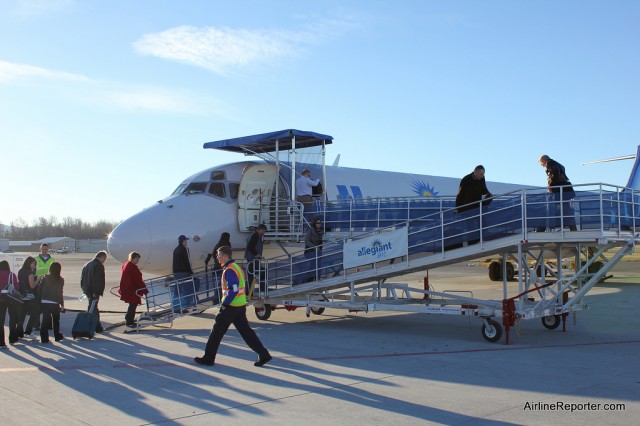
Boarding an Allegiant MD-80 in Bellingham. Image from David Parker Brown / AirlineReporter.com.
How does Allegiant board? ’“ Allegiant offers many different add-ons to their standard fare and does a nice job of providing ala carte service where you can add additional services to their basic fare. Among their options are Priority Boarding for $9.99 (allows you to board first), Premium Seat Selection $9.99 (an assigned seat near the front or exit row), Standard Seat Assignment $6.99 (assigned seat towards the back of the plane). You can certainly opt to fly without paying any of those additional fees, but be prepared to sit in a middle seat. Their boarding process allows people that paid for priority boarding to board first, followed by those who need a little extra time. Then passengers who paid for the standard seat assignment are allowed to board followed by those who do not have seat assignments but have young children. Lastly it goes to open seating and people get to fend for them self to find an open seat.
STORY: Flight review flying Allegiant Airlines
How does American Airlines board? ’“ American is one of the airlines that actually disclose their boarding process on their website. Many airlines do not give a specific process but simply expect you to pay attention when you get to the airport. American employs a process similar to most of the other legacy carriers in that they give priority to elites and then general boarding. Their process consists of preboarding First Class, Uniformed Military, AAdvantage Executive Platinum, and oneworld Emerald. On aircraft with three class service, Business Class is boarded next. The next group consists of AAdvantage Platinum and oneworld Sapphire, followed by Priority AAccess and oneworld Ruby. From there, American is in the home stretch boarding groups 1-4. Of course this could all be changing with the airline merging with US Airways.
STORY: Taking American’s 737 Sky Interior Delivery Flight
How does Delta Air Lines board? ’“ The world’s largest airline by passengers carried and fleet size has developed a good reputation among both business and leisure travelers. They utilize a zone boarding process similar to many of the other large airlines. They first offer preboarding to their Sky Miles Medallion elite level fliers (Diamond, Platinum, and Gold) and passengers traveling in the first class cabin. On international flights they then invite passengers traveling in BusinessElite, Sky Miles Medallion Silver frequent fliers, and partner elites to board. Delta then begins general boarding via a zone process beginning from the rear of the aircraft. Depending on the size of the plane and whether it is an international or domestic flight, Delta can have as many as nine different boarding groups.
How does Frontier Airlines board? ’“ Denver’s hometown airline has been undergoing some big changes in recent years. Frontier uses a zone boarding style similar to many other carriers, beginning with preboarding for passengers with special needs, which include passengers who need assistance and unaccompanied minors. Similarly to Jet Blue’s Silent Boarding group, they do not announce a special boarding for this group. The one nice thing is that you don’t have to make a reservation in advance for the extra time, whereas you do on Jet Blue. Frontier then invites their Summit Members to board which is the top tier of their EarlyReturns frequent flier program. They then begin priority boarding and Zone 1 which includes Ascent members (second tier of EarlyReturns), as well as people traveling on a Classic Plus fare or seated in Stretch seating. Next, they invite families with small children and passengers requiring additional time or assistance to board. They also have a separate boarding group here for people who are not utilizing overhead bins (it pays to pack lightly). After that, they begin boarding with Zone 2, which are passengers in Select seating. Finally, they board Zone 3 which is pretty much anyone else. So while Frontier technically only has three zones, they really have seven different boarding groups.
STORY: Review flying Frontier Airlines to Denver and back
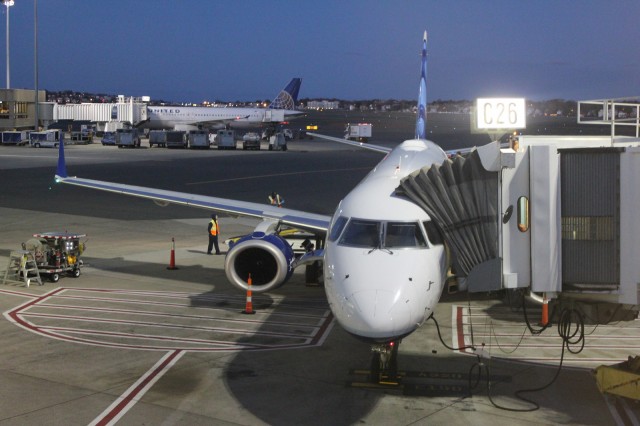
A JetBlue E-190 in Boston. Image from David Parker Brown / AirlineReporter.com.
How does JetBlue board?’“ As is typically true with most things JetBlue, they try to keep their boarding process simple. They begin with pre-boarding which they call Silent Boarding. This is a service that must be requested in advance and is designed for people who have requested or appear to need additional time boarding. The interesting bit is that they do not make a gate announcement (hence the Silent Boarding name), so it is up to you to request this service and show up at the right time. After Silent Boarding they begin priority boarding for Mosaic and Even More Space customers. Mosaic is their elite level program which has many of the same benefits as competitors (priority security lane, preferred seating, 2 free checked bags, bonus points, and dedicated customer service line). Even More Space is an option that you can select when booking and just like it name suggests you get more space.
JetBlue then invites families with children under the age of 2 and other individuals who need additional time to board. It’s interesting that they have their Silent Boarding and then a separate pre-board for people who may need additional time. Finally, they board from the rear of the aircraft forward in five row increments. This begins with individuals in rows 20-25, then 15-25, 10-25, and lastly 5-25.
STORY: Flying JetBlue from the Bahamas to Boston in an E-190
How does Southwest Airlines board? ’“ Southwest is unique since they do not actually assign seats. So it’s still important to get a good boarding group to ensure a good seat and overhead storage. Their overall process contains a boarding group (A, B, or C) and a number (1-60) and they have passengers queue up in the boarding area in a line according to the boarding group and number. Some have called this process a “cattle call,” but really it seems like less people end up standing around waiting to be called than with other methods. Alternatively, you can buy a Business Select or EarlyBird Check-In to be among the first to board. For frequent fliers, it is a pretty simple boarding process, but it seems that people who do not fly often, easily get confused on how to board a Southwest plane.
STORY: Guide to getting a good seat on Southwest Airlines
How does Spirit Airlines board? ’“ Spirit is the ultimate King of low cost travel and their boarding process and baggage policies reflect that. Like Allegiant, their base fares are always amongst the lowest but Spirit is betting you will purchase additional services. They not only have fees for seat selection but also other amenities such as checked baggage and soft drinks on board. Spirit employs a zone boarding process similar to many airlines with some differences. They allow unaccompanied minors and others requiring assistance first, followed by folks sitting in their Big Front Seats (first row or two depending on aircraft that are in a 2-2 layout and have better seat pitch), and then the remaining zones 2, 3, & 4. The one difference is that they board from the front to the back.
How does United Airlines board? ’“ No sooner than I finished writing the original section on United, the airline made yet another change in their boarding process. This marks the fifth time in less than two years that the airline has changed their procedure. This is not surprising as mergers always result in some chaos, but it would seem smart for the airline to stick to one process for a while — hopefully this one will stick.
Under the new process, they begin with pre-boarding of customers with disabilities, Global Services, and uniformed military personnel. Following that, Group 1 is invited to board which included Global Services (for customers that did not pre-board), Premier 1K, Premier Platinum, and their premium cabins. Group 2 is essentially for all of the United and partner elite fliers including Premier Gold and Silver, Star Alliance Gold and Silver, MileagePlus Presidential Plus and Club cardholders, MileagePlus Explorer and Awards cardholders.
It’s interesting that United does not give greater priority to their Gold and Silver level fliers ’“ someone who holds their credit card is given the same boarding priority. United has really been pushing their Explorer credit card so it’s no surprise they used priority boarding as a selling point. United then opens up for groups 3-5 for general boarding from the rear of the aircraft. Unlike other airlines, they no longer give priority boarding to families traveling with infants or young children. Those families must board when their group number is called.
How does US Airways board? ’“ Much like other legacy carriers, US Airways uses a zone boarding process. They begin with preboarding of First Class / Envoy, Preferred members of their Dividend Miles program, and Star Alliance Gold members. After preboarding, zone 1 consists of the bulkhead row and exit row seats without under the seat storage. It’s interesting that they allow exit row seats without under the seat storage to board early. I realize that these folks have responsibilities since they are in the exit row, but does it really take them longer to board?
Zone 2 is made up of US Airways Premier World MasterCard holders, US Airways Visa Signature card holders, ChoiceSeats, and Exit row seats with under-the-seat storage. Much like United, they have given their credit card holders a priority boarding group. At least the elite members of their Dividend Miles program get a higher priority (United has the same boarding priority for Gold and Silver elites as they do for their credit card holders). Finally they board from the rear forward beginning with zones 3-5. It’s a fairly straightforward process which is nice.
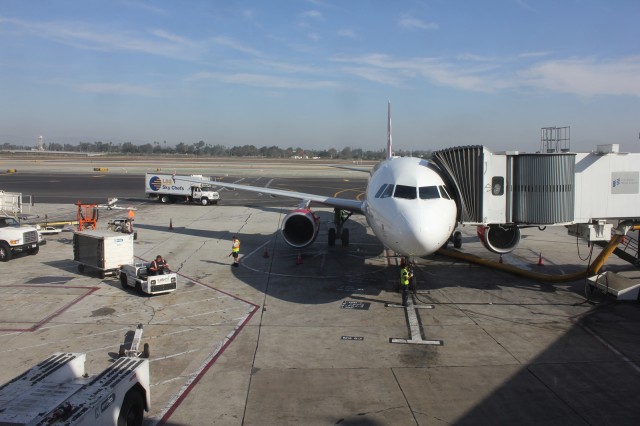
Virgin American Airbus A320 at LAX. Image by David Parker Brown / AirlineReporter.com.
How does Virgin America board? ’“ Virgin American starts with allowing their First Class passengers to board before allowing folks with children and disabled people who need a little more time. Then they move on to Main Cabin Select, which are in the first row of economy and the exit rows so they have more legroom. The Main Cabin Select fare also comes with complimentary food and drinks and one free checked bag. After those two groups, they board the Main Cabin Express group. Ultimately, this is just an add-on that you can purchase to be among the first to board.
Being that I really like to be sit near the front and be able to get off the plane as soon as possible, this fare is quite appealing. Finally, they move on to a group based boarding process, starting with A and moving through the alphabet. I recall on one flight it went groups A-D, but on another it went A-F.
STORY: Flying in Virgin America’s First Class
Hopefully this article can provide some insight the next time you are traveling and are curious about how different airlines board. In the comments, be sure to talk about your boarding experiences and which processes do you like (or hate the most)?
Related links in airline boarding:
 |
This story written by…Colin Cook, Correspondent.Colin is an avid AvGeek who works in finance and is based in the Seattle area. He has an immense passion for aviation and loves to travel as much as possible.
@CRoscoe2121 |







